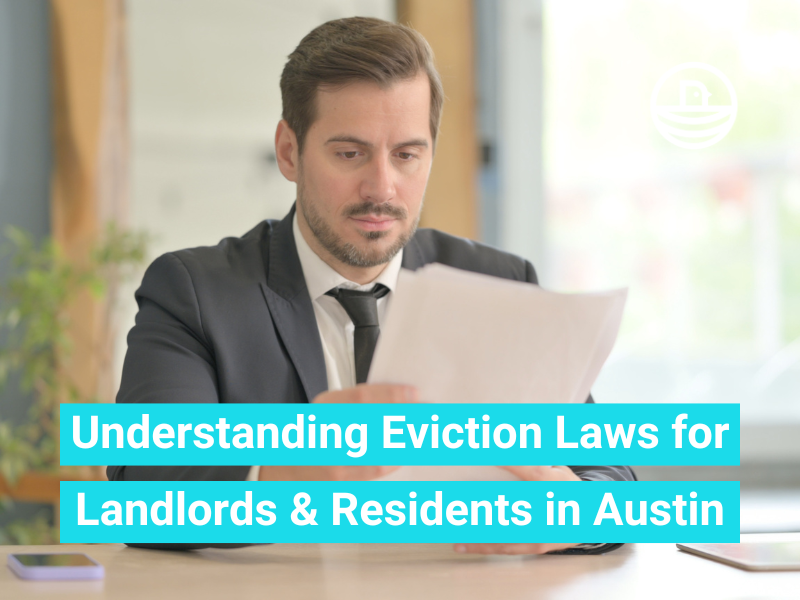According to a recent survey, Austin, Texas is the top U.S. metro for people renting their first home instead of buying. With inflation making everything more expensive, many Austinites are opting to rent, seeing it as the smarter financial choice. While this is promising for Austin landlords, it also means more residents are at risk of being evicted.
Reports show that eviction filings are on the rise in Austin, especially as temporary protections from the COVID-19 pandemic fade. Fortunately, Texas has detailed laws in place to balance the rights of both landlords and residents. Understanding these regulations is critical for anyone going through the process. Whether you’re managing a property or facing eviction, this guide will walk you through the steps, timelines, and rights that apply to evictions in Austin, Texas.
Austin, Texas Eviction Laws - What You Need to Know
.png)
Evictions in Austin are regulated by the Texas Property Code, which outlines regulations for both landlords and residents. These laws protect landlords from tenant violations while also ensuring tenants aren’t treated unfairly. Below is a step-by-step explanation of how the eviction process works in Austin.
Notice to Vacate
The eviction process starts with the notice to vacate. This is a formal letter that tells the tenant what the issue is, giving them a chance to fix it or move out. The standard notice period is three days, but some lease agreements might require more time. Under the CARES Act, a 30-day notice may be necessary in certain federal cases. To deliver the notice, landlords can:
Hand it to someone 16 or older at the rental property.
Send it by certified mail.
Post it to the rental unit if no one is home.
The following should be clearly stated on the notice:
The reason for eviction (such as unpaid rent or a lease violation).
How long the tenant has to resolve the issue.
If details are missing or the notice is delivered incorrectly, the case could get thrown out, so it’s important to follow the rules closely.
Legal Reasons for Eviction
Landlords can’t evict tenants for just any reason. Texas law outlines what counts as a valid eviction, including:
Nonpayment of rent
Breaking lease rules
Illegal activities
Holding over (staying beyond the lease end-term)
Landlords cannot evict residents in retaliation for things like reporting unsafe conditions or requesting repairs. Discrimination based on race, religion, or family status is also illegal.
Filing an Eviction Case
If the tenant doesn’t fix the problem after the notice to vacate, the next step is filing an eviction lawsuit in court. The lawsuit must be filed in the justice of the peace precinct where the property is located.
The filing fee for an eviction in Austin, Texas is $116. Upon filing, landlords will need to provide these documents to the court:
A copy of the lease
The notice to vacate
Evidence of the issue (like unpaid rent records or photos of property damage)
Once the case is filed, a sheriff or constable will deliver the court papers to the tenant.
Court Hearing
After the lawsuit is filed, a hearing is set for 10-21 days later. This is where landlords and tenants alike have a chance to explain their side. Both parties can present evidence to the judge, such as communication records, proof of retaliation or discrimination, or improper notices to vacate.
After hearing both sides, the judge makes a decision. If they rule in favor of the landlord, the court will issue a judgment of possession, giving the landlord the right to the property. If the tenant wins, the eviction process halts. Each side has five days to appeal.
Writ of Possession
If the landlord wins but the tenant chooses not to leave, the landlord can request a writ of possession to enforce the eviction. This is the official document allowing law enforcement to get involved.
The earliest the writ of possession can be issued is five days after the hearing. Law enforcement must provide 24 hours of notice before they forcibly remove the tenant and their belongings from the property.
Following these steps in order ensures that the eviction is carried out legally and fairly.
Eviction Rules for Austin Landlords
Going through the eviction process can be stressful for landlords. Following these tips can make it easier:
Issue the Notice Correctly: Make sure you deliver the notice to vacate with enough time and in the right way. Even small mistakes can delay the process.
Keep Records: Openly communicate with your tenants and make copies of leases, payment histories, and photos. This can strengthen your case in court.
File in the Right Precinct: Filing in the wrong court can waste time.
Follow the Law: Changing locks, turning off utilities, removing belongings, or harassing tenants is against the law and could lead to penalties.
Hire Help: Property management companies can handle the eviction process for you, reducing costs and saving you time and stress.
By staying organized and following the rules, landlords can save time, money, and headaches.
Eviction Rights for Austin Residents
Just like landlords have rights to their property, residents also have certain protections according to the law. If you’re at risk of being evicted, here are some important guidelines to be aware of:
You Have Time: Receiving a notice to vacate doesn’t mean you have to leave right away. Your landlord still has to go to court and win the case before you can be forced out.
Look for Errors: Was the notice delivered correctly? Does it meet legal regulations? If not, you may be able to fight the eviction.
Go To the Hearing: Missing your court date can result in a default judgment. Bring evidence like payment receipts, proof of repairs, or documentation of landlord retaliation.
Appeal: If the court rules in favor of the landlord, you have five days to file an appeal.
Ask for Help: Evictions can be confusing. If there’s anything you’re unsure about, organizations like Texas RioGrande Legal Aid offer free or low-cost legal services to those who qualify. They can help you build your case and keep the process fair.
Understand Discrimination and Retaliation: Both of these are serious offenses; they’re not only unfair but also illegal. If you’re facing discrimination or retaliation from your landlord, you can report it through the HUD website.
Knowing your rights can help you avoid being treated unfairly during the eviction process. If your landlord is threatening you with an eviction, don’t hesitate to reach out for help. The earlier you act, the more options you have to protect yourself.
Handling Evictions The Right Way
Evictions in Austin, Texas can be stressful for everyone involved. Following the law is the best way to protect yourself, whether you’re a landlord or a tenant. As a landlord, there’s no such thing as being too cautious. To make sure you and your property are protected, consider working with a professional property manager like Evernest. For just $150, you can purchase our Eviction Protection Plan, which covers all of the fees associated with the eviction process. Contact an Evernest representative today to learn more about how these services could benefit you.


